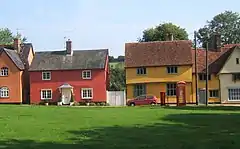Robert Gardiner (Chief Justice)
Sir Robert Gardiner (1540-1620) was an English-born judge in Ireland who held the office of Lord Chief Justice of Ireland for eighteen years. In addition to his judicial duties he was a trusted political adviser to both Elizabeth I and James I. He sat in the English House of Commons in the short-lived Addled Parliament of 1614.[1]
Early career

He was the son of William Gardiner, a substantial yeoman farmer who held lands at Hartest and Shimpling in Suffolk, and his wife Alice, widow of a Mr Ling. Born in 1540, he entered Lincoln's Inn in 1562 and was reader of the Inn in 1585. He was called to the Bar in 1570.[2]
Irish career
Queen Elizabeth, who despite their occasional quarrels, had great trust in Gardiner, sent him to Ireland as Lord Chief Justice in 1586 with exceptional powers to review the operation of the Courts of Common Law. Crawford[3] states that he had "a mandate to reform both courts and administration", but it does not seem that he had much success in this mission. His appointment was strongly endorsed by Sir Christopher Wray, his counterpart as English Lord Chief Justice.[4]
Irish politics at the time was dominated by the feud between the Lord Deputy of Ireland, Sir John Perrot, and his opponents, who were led by Adam Loftus, the Archbishop of Dublin. Gardiner took Loftus' side and worked for Perrot's recall.[5] He was appointed one of the judicial commissioners to deal with the aftermath of the Desmond Rebellion in 1588: its proceedings caused a good deal of criticism on the grounds of bias as virtually all claims were decided in the Crown's favour. He negotiated with Hugh O'Neill in 1594 and 1596, leading to a serious quarrel with the Queen and his temporary disgrace. He served as Lord Justice of Ireland in 1597. He fought against Hugh O'Neill in 1598 and against the Spanish Army at Kinsale in 1601-2.[6]
The Queen and Gardiner quarreled in 1596/7, apparently over the humiliating peace terms which he agreed with the rebel Hugh O'Neill, 2nd Earl of Tyrone, which in the Queen's view amounted to a virtual abdication of English rule in Ireland, and he was in temporary disgrace as a result.[7] Nonetheless she retained great confidence in Gardiner, and knighted him in 1591. He seems to have been considered irreplaceable by each successive Lord Deputy of Ireland, who ignored his constant pleas, from early in his career in Ireland, to be allowed to retire on health grounds. Like some (though by no means all) English settlers in Ireland he disliked the damp Irish climate and believed that it was damaging his health. In addition his judicial duties were so heavy- for a time he was effectively in charge of three of the four Irish High Courts- that in 1592 Sir William FitzWilliam, the Lord Deputy, while refusing to allow him to retire, voiced concerns about the burden he was carrying.[8] In 1603 he was finally permitted to retire.[9]
Later years
His public career was by no means over, since the new King James I found him as dependable a royal servant as Queen Elizabeth had. He was entrusted with the reform the governments of Jersey and Guernsey in 1604-5, and was at Court advising on Irish affairs in 1607 and again in 1613-14; he was prominent in local government in as late as 1609.[10]
In 1614, rather unexpectedly given his advanced age, he entered the House of Commons as member for Suffolk. He was diligent in attendance, and spoke several times, but the so-called Addled Parliament was completely ineffective and was dissolved after only two months.[11]
In his last years he founded almshouses at Elmswell, where he was lord of the manor, for the care of six poor women, three from Elmswell and three from nearby Woolpit, where he also held the manor. The charity still exists. Through his marriage into the Spring family he held for his lifetime the manor of Pakenham, Suffolk.[12] He died in 1620 and was buried at Elmswell; a memorial was erected to him in the parish church.[13]

Family
He married firstly Anne Cordell (died 1587), daughter of Robert Cordell, a brewer, a cousin of the prominent judge and politician Sir William Cordell. He married secondly Thomasine Barker, daughter of John Barker of Ipswich, and thirdly Mary (or Anne) Trelawney, daughter of John Trelawney of Menheniot, Cornwall and Anne Reskymer, and widow of John Spring of Lavenham. His three children all died young; most of his estate passed to a grandnephew, Gardiner Webb, and the residue to his sister Mary Snow.[14] Through his third marriage he was the stepfather of the politician Sir William Spring. Robert seems to have treated William very much as though he were his own son, and raised him in his own strong Puritan beliefs.[15]
Character
Francis Bacon thought highly of Gardiner, urging one of his successors as Lord Chief Justice to follow the example of his "constancy and integrity".[16] Bacon's high opinion of Gardiner was shared by many of his colleagues. Chief Justice Wray praised him as "wise, learned, discreet and courageous". Sir Henry Wallop called him the most constant man who was ever sent from England to govern Ireland. Lord Deputy FitzWilliam said that he was so "wise, temperate and useful" that his services could not easily be spared.[17]
In an age when a good deal of official corruption was tolerated, Gardiner had a reputation for honesty. He himself maintained that he had no interest in lining his pockets. However he certainly profited from his office to some extent, as he was able to purchase the manors of Elmswell and Woolpit, as well as lands in Norfolk.[18]
| Legal offices | ||
|---|---|---|
| Preceded by James Dowdall |
Lord Chief Justice of Ireland 1586–1603 |
Succeeded by James Ley |
References
- Thrush, Andrew editor The History of Parliament- the House of Commons 1604-1629
- Ball, F. Elrington The Judges in Ireland 1221-1921 John Murray London 1926 Vol.1 p.222
- Crawford, Jon G. A Star Chamber Court in Ireland- the Court of Castle Chamber 1571-1641 Four Courts Press Dublin 2006 p.249
- Thrush History of Parliament
- Crawford p.104
- Ball, p.222
- Thrush History of Parliament
- Thrush History of Parliament
- Ball, p.222
- Ball, p.222
- Thrush History of Parliament
- Ball, p.222
- Kelly's Directory 1916
- Ball, p.222
- Thrush History of Parliament
- Ball, p.240
- Thrush History of Parliament
- Thrush History of Parliament